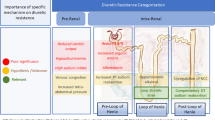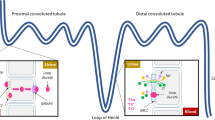Abstract
B-type natriuretic peptide (BNP) is a cardiac neurohormone and is released as prepro BNP and then enzymatically cleaved to the N-terminal proBNP (NT-proBNP) and BNP upon ventricular myocyte stretch. Blood measurements of BNP and NT-proBNP have been used to identify patients with heart failure (HF). Clinical considerations for these tests include their half-lives in plasma, dependence on renal function for clearance, interpretation of their units of measure, and the rapid availability of the test results. The BNP assay is currently used as a diagnostic and prognostic aid in HF. In general, a BNP level below 100 pg/mL excludes acutely decompensated HF. Recombinant, human BNP (nesiritide) is an approved intravenous treatment for acute, decompensated HF. This paper reviews the literature concerning the use of this peptide as a diagnostic test and as an intravenous therapy.
Similar content being viewed by others
References and Recommended Reading
McCullough PA, Philbin EF, Spertus JA, et al.: Confirmation of a heart failure epidemic: findings from the Resource Utilization Among Congestive Heart Failure (REACH) study. J Am Coll Cardiol 2002, 39:60–69.
American Heart Association: Heart disease and stroke statistics-2003 update. http://www.americanheart.org. Accessed December 1, 2003.
Jessup M, Brozena S: Heart failure. N Engl J Med 2003, 348:2007–2018.
Krumholz HM, Chen Y, Wang Y, et al.: Predictors of readmission among elderly survivors of admission with heart failure. Am Heart J 2000, 139:72–77.
Stoupakis G, Klapholz M: Natriuretic peptides: biochemistry, physiology, and therapeutic role in heart failure. Heart Dis 2003, 5:215–223. This is an in-depth, up-to-date review of the natriuretic peptides. It emphasizes biochemistry and physiology, and the role of natriuretic peptides as diagnostic and prognostic markers in HF. There is a brief review of therapeutic modalities in HF.
Levin ER, Gardner DG, Samson WK: Mechanisms of disease: natriuretic peptides. New Engl J Med 1998, 339:321–328.
Kazanegra R, Cheng V, Garcia A, et al.: A rapid test for B-type natriuretic peptide correlates with falling wedge pressures in patients treated for decompensated heart failure: a pilot study. J Card Fail 2001, 7:21–29.
Maisel AS, McCullough PA: Cardiac natriuretic peptides: a proteomic window to cardiac function and clinical management. Rev Cardiovasc Med 2003, 4(Suppl 4):S3-S12.
McCullough PA, Sandberg KR: Sorting out the evidence on natriuretic peptides. Rev Cardiovasc Med 2003, 4(Suppl 4):S13-S19.
Maisel AS, Krishnaswamy P, Nowak RM, et al.: Rapid measurement of B-type natriuretic peptide in the emergency diagnosis of heart failure. N Engl J Med 2002, 347:161–167. This large, seven-center, multinational trial confirmed the role of BNP in the diagnosis of HF. In patients admitted to the emergency department with shortness of breath, BNP was more accurate than clinical history, physical examination, or laboratory values.
McCullough PA, Nowak RM, McCord J, et al.: B-type natriuretic peptide and clinical judgment in emergency diagnosis of heart failure. Analysis from Breathing Not Properly (BNP) Multinational Study. Circulation 2002, 106:416–422.
McCullough PA, Duc P, Omland T, et al.: B-type natriuretic peptide and renal function in the diagnosis of heart failure: an analysis from the Breathing Not Properly Multinational Study. Am J Kidney Dis 2003, 41:571–579. This is the first study to define the relationship between eGFR level, CHF, and BNP level. In patients with chronic kidney disease, BNP level remained an independent predictor of CHF. Renal function was found to influence the optimal cut point for BNP, particularly for those with eGFR less than 60 mL/min per 1.73 m2.
Lubien E, DeMaria A, Krishnaswamy P, et al.: Utility of B-natriuretic peptide in detecting diastolic dysfunction. Comparison with Doppler velocity recordings. Circulation 2002, 105:595–601.
Maisel AS, McCord J, Nowak RM, et al.: Bedside B-type natriuretic peptide in the emergency diagnosis of heart failure with reduced or preserved ejection fraction. J Am Coll Cardiol 2003, 41:2010–2017. These authors examined the BNP levels of the subset of patients with nonsystolic HF from the Breathing Not Properly Multinational Study. BNP was shown to be a useful test to distinguish patients with nonsystolic HF from patients without HF, but it cannot reliably differentiate nonsystolic from systolic HF.
Koglin J, Pehlivanli S, Schwaiblmair M, et al.: Role of brain natriuretic peptide in risk stratification of patients with congestive heart failure. J Am Coll Cardiol 2001, 38:1934–1941.
Harrison A, Morrison LK, Krishnaswamy P, et al.: B-type natriuretic peptide predicts future cardiac events in patients presenting to the emergency department with dyspnea. Ann Emerg Med 2002, 39:131–138.
Berger R, Huelsman M, Strecker K, et al.: B-type natriuretic peptide predicts sudden death in patients with chronic heart failure. Circulation 2002, 105:2392–2397. In this study, neurohormonal, clinical, and hemodynamic variables were analyzed in 452 patients with LVEF less than 35% over a 3-year period. Univariate predictors for sudden death included log BNP, log N-terminal ANP, big endothelin, and NYHA class. In the multivariate model, log BNP was the only independent predictor of sudden death, firmly establishing the role of BNP as a marker for sudden death in CHF.
Vrtovec B, Delgado R, Zewail A, et al.: Prolonged QTc interval and high B-type natriuretic peptide levels together predict mortality in patients with advanced heart failure. Circulation 2003, 107:1764–1769.
Horwich TB, Patel J, MacLellan R, Fonarow GC: Cardiac troponin I is associated with impaired hemodynamics, progressive left ventricular dysfunction, and increased mortality rates in advanced heart failure. Circulation 2003, 108:833–838. This study explored the prognostic implications of BNP and cTnI levels in patients with advanced HF (50% NYHA class IV). The combination of elevated cTnI and BNP identified patients with a markedly increased risk for death.
Bettencourt P, Ferreira S, Azevedo A, Ferreira A: Preliminary data on the potential usefulness of B-type natriuretic peptide levels in predicting outcome after hospital discharge in patients with heart failure. Am J Med 2002, 113:215–219.
Cheng V, Kazanagra R, Garcia A, et al.: A rapid bedside test for B-type peptide predicts treatment outcomes in patients admitted for decompensated heart failure: a pilot study. J Am Coll Cardiol 2001, 37:386–391.
Anand IS, Fisher LD, Chiang YT, et al.: Changes in brain natriuretic peptide and norepinephrine over time and mortality and morbidity in the Valsartan Heart Failure Trial (Val-HeFT). Circulation 2003, 107:1278–1283. Changes in BNP and plasma norepinephrine levels were associated with morbidity and mortality in this large, prospective evaluation of patients with HF. These data support a role for serial biomarkers in the management of patients with HF.
Mueller C, Scholer A, Laule-Kilian K, et al.: Use of B-type natriuretic peptide in the evaluation and management of acute dyspnea. N Engl J Med 2004, 350:647–654.
Troughton RW, Frampton CM, Yandle TG, et al.: Treatment of heart failure guided by plasma aminoterminal brain natriuretic peptide (N-BNP) concentrations. Lancet 2000, 355:1126–1130.
Colucci WS, Elkayam U, Horton DP, et al.: Intravenous nesiritide, a natriuretic peptide, in the treatment of decompensated congestive heart failure. N Engl J Med 2000, 343:246–253.
Yoshimura M, Yasue H, Morita E, et al.: Hemodynamic, renal, and hormonal responses to brain natriuretic peptide infusion in patients with congestive heart failure. Circulation 1991, 84:1581–1588.
Marcus LS, Hart D, Packer M, et al.: Hemodynamic and renal excretory effects of human brain natriuretic peptide infusion in patients with congestive heart failure. A double-blind, placebo-controlled, randomized crossover trial. Circulation 1996, 94:3184–3189.
Peacock WF 4th, Emerman CL, Young J, et al.: Nesiritide in congestive heart failure associated with acute coronary syndromes: a pilot study of safety and efficacy. J Card Fail 2004, 10:120–125.
Michaels AD, Klein A, Madden JA, Chatterjee K: Effects of intravenous nesiritide on human coronary vasomotor regulation and myocardial oxygen uptake. Circulation 2003, 107:2697–2701. This is a small, prospective evaluation of the effects of intravenous nesiritide on coronary hemodynamics and myocardial oxygen uptake as determined by Doppler-tipped coronary guidewires. This is the first study to evaluate these effects in human coronary vasculature.
Burger AJ, Horton DP, LeJemtel T, et al.: Effect of nesiritide (b-type natriuretic peptide) and dobutamine on ventricular arrhythmias in the treatment of patients with acutely decompensated congestive heart failure: the PRECEDENT study. Am Heart J 2002, 144:1102–1108.
Burger AJ, Elkayam U, Neibaur MT, et al.: Comparison of the occurrence of ventricular arrhythmias in patients with acutely decompensated congestive heart failure receiving dobutamine versus nesiritide therapy. Am J Cardiol 2001, 88:35–39.
Silver MA, Horton DP, Ghali JK, Elkayam U: Effect of nesiritide versus dobutamine on short-term outcomes in the treatment of patients with acutely decompensated heart failure. J Am Coll Cardiol 2002, 39:798–803.
Chang R, Elatre W, Heywood J: Effect of nesiritide on length of hospital stay in decompensated heart failure. J Am Coll Cardiol 2003, 41(Suppl A):161A.
Butler J, Emerman C, Peacock WF, et al.: The efficacy and safety of B-type natriuretic peptide (nesiritide) in patients with renal insufficiency and acutely decompensated congestive heart failure. Nephrol Dial Transplant 2004, 19:391–399.
Cataliotti A, Boerrigter G, Costello-Boerrigter LC, et al.: Brain natriuretic peptide enhances renal actions of furosemide and suppresses furosemide-induced aldosterone activation in experimental heart failure. Circulation 2004, 109:1680–1685.
Publication Committee for the VMAC Investigators (Vasodilatation in the Management of Acute CHF): Intravenous nesiritide vs nitroglycerin for treatment of decompensated congestive heart failure: a randomized controlled trial. JAMA 2002, 287:1531–4040. This is the first large, multicenter, randomized trial to evaluate the clinical effects of intravenous nesiritide added to standard treatment for decompensated CHF. Nesiritide reduced PCWP (out to 24 hours) more effectively than did nitroglycerin, with a similar adverse effect profile.
McCullough PA, Joseph K, Mathur VS: Diagnostic and therapeutic utility of B-type natriuretic peptide in patients with renal insufficiency and decompensated heart failure. Rev Cardiovasc Med 2003, 4(Suppl 7):S3-S12.
Yancy C: Management of patients with congestive heart failure after hospitalization: results from the Follow Up Serial Infusions of Nesiritide (FUSION) trial. J Card Fail 2003, 9(Suppl 11):34.
Abraham WT, Lowes BD, Ferguson DA, et al.: Systemic hemodynamic, neurohormonal, and renal effects of a steady-state infusion of human brain natriuretic peptide in patients with hemodynamically decompensated heart failure. J Card Fail 1998, 4:37–44.
Author information
Authors and Affiliations
Rights and permissions
About this article
Cite this article
Gallagher, M.J., McCullough, P.A. The emerging role of natriuretic peptides in the diagnosis and treatment of decompensated heart failure. Curr Heart Fail Rep 1, 129–135 (2004). https://doi.org/10.1007/s11897-004-0022-7
Issue Date:
DOI: https://doi.org/10.1007/s11897-004-0022-7




